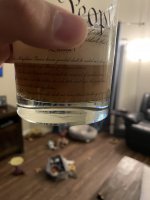So I added the grains to boiling water which then would have cooled over the 15 minutes. The hops came in tea bags im pretty sure they were 12g each. So I tipped the rapid creek tin into fermenter. I then put hot water in the rapid creek tin and put the hop tea bags in the tin. Then I poured the hops tea bags and tin water.
Issues 1 and 2 are correct. 3) it wasn’t enjoyable visually because it was no longer hazy. Flavour and aroma were similar but I guess the mouth feel was more watery.
Thanks so much for your insight
I take it you had one tea bag of each hop, so 24 grams for a 22+L batch.
A couple of general tips to help improve future beer:
If your water contains chlorine/chloramines, add some campden to it before using, which will get rid of it. (1/2 tablet crushed up per 10 gallons of water). Chlorine can cause off flavors when it mixes with the malts. Since municipal water supplies can change chlorination amounts over time, even if you can't taste the problem now, so it's cheap insurance against a batch getting really chlorinated water and your beer being off.
Golden Naked Oats are a crystal malt, so they steep OK. How much did you use? They should have been crushed/ground up. You should consider steeping them in a gallon or 2 of water at 140-160F (~60-70C) for 20-30 minutes or so, then taking them out (ideally bringing that to a boil to make sure that it is sanitized) and adding that to the fermenter.
Specifically this batch:
I'm not sure about a loss of head retention - is this consistent with all the bottles, or intermittent? (i.e. did you have several beers in the first week of drinking [6th week in bottles] and they were all great head retention, and now they are all poor head retention? This could also be a glassware thing. Tiny amounts of soap or dishwasher spot preventer can affect this, so try rinsing your glassware well before pouring.
The other problem is haze - you like it cloudier, and it cleared. I don't think you really have a problem with the beer, the clearing is normal and expected.
Generally people have aimed for clear beer in the past, but with the popularity of New England IPA (NEIPA / "hazys") this has somewhat changed. In good examples of the style, the haziness comes partly from the malts used, but mostly from the way massive amounts of hops are used.
I don't think NEIPA is a good beginner style, because it is very sensitive to oxidation, which requires more advanced techniques to avoid. It's also really expensive to make because of all the hops, and would probably require some process changes from what you are doing.
For your application, to get some more haze, you could try taking a couple gallons of wort (take it out of your fermenter after mixing in malt but before adding the yeast), bring it to 180F/82C and steep 3-4 oz (100g or so) of hops for 20-30 minutes before putting it in (let it cool to room temp before adding yeast). That would probably give some light hop haze, but these things can settle out over time. It would certainly make the beer
much hoppier, so it would have a different taste.
For your current bottles, you could try taking one and inverting it several times a few minutes before opening to let the yeast mix back up into the beer. Maybe you like the taste of the yeast and other small particles in suspension.























![Craft A Brew - Safale S-04 Dry Yeast - Fermentis - English Ale Dry Yeast - For English and American Ales and Hard Apple Ciders - Ingredients for Home Brewing - Beer Making Supplies - [1 Pack]](https://m.media-amazon.com/images/I/41fVGNh6JfL._SL500_.jpg)




































